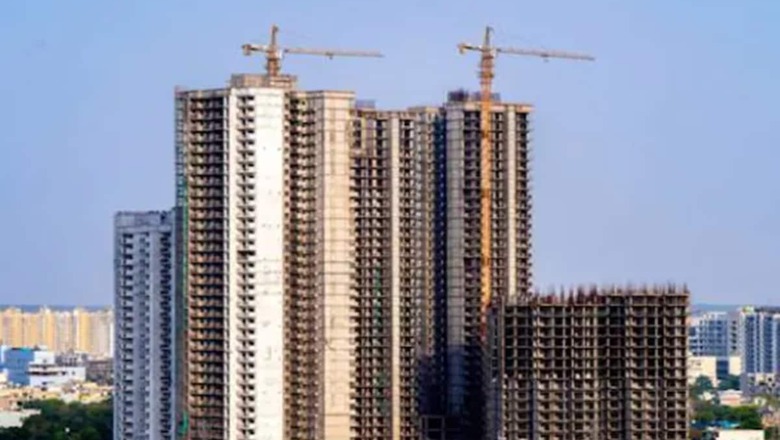
views
India’s resilience in the face of global economic headwinds became evident as the real estate sector attracted over $5.8 bn institutional investments across 53 deals in 2023, a 14% percent increase compared to 2022. ‘Investing in Tomorrow: The Real Estate Journey of 2023’, a JLL India report anticipates investor confidence in the Indian growth story to continue in 2024 as well.
In 2023, the largest contributors were foreign institutional investors with 63% share of the total investments. Americas, the conventional highest contributors in investments, witnessed a significant dip to 23% share of investments compared to the high of 43% share in 2022.
Also Read: Budget 2024 Expectations: ‘Affordability’ Top Priority For Real Estate, Know Key Demands
However, the market witnessed a significant increase in investments from domestic domiciled investors – 37% compared to an average of 19% in the previous 5 years.
Equity continued to dominate investments in real estate at 81% share of the total investments. In 2023, non-core assets led transaction volumes at 53% of the overall volumes, thus indicating a higher risk appetite and a focus on potentially higher returns by investors.
According to the report, the office sector will continue to be the favoured sector in 2024.
The office sector continued to lead by a huge margin, at 52% share in the investment pie, followed by residential and warehousing at 16% and 13% respectively. Capital flow in the office sector witnessed an increase by 61% – from $1.8 bn 2022 to $3 bn across 15 deals in 2023.
Newer sectors to attract investment
Newer sectors like warehousing, data centres, student housing etc. will attract a major share of institutional investments in the years to come. Student housing as an asset class has been gaining attention from institutional investors in India. With the growing number of students pursuing higher education and the increasing demand for quality accommodations, there is a significant opportunity for institutional investment in this sector.
“Inflation and uncertainty about the direction of the global economy did not seem to be a deterrent for institutional investments in India in 2023. Investments continued to cross the 5 bn mark, a trend that has continued since 2018. Multiple rate hikes in the Americas have curbed investment activities from the US and Canada. However, 2023 saw a significant contribution from the APAC region. The prospect for the domestic economy currently remains bright and we are expecting this optimistic trend to continue in CY 2024,” said Lata Pillai, senior managing director & head of capital markets, JLL India.
“While the upcoming elections may cause delays in decision-making, the India growth story will continue to be robust, driven by its inherent strengths and continued focus on economic development,” added Pillai.
Platform Commitments
Additionally, 2023 witnessed the announcement of $2.8 bn of platform commitments to be invested over the next few years. There was a significant dip (38%) in platform commitments as compared to 2022, which had witnessed the highest growth of platform deals- 174% increase from 2021.
While investments have seen an increase, the global economic slowdown seems to have had an impact on investor sentiments for long term commitments. The largest platform commitment deals last year was between Ivanhoe Cambridge and Mapletree, with an investment capacity of over $1.8 bn, in the space of technology-led offices in India.
REITs – unlocking potential in the public markets.
The introduction of REITs in India has opened additional avenues for real estate companies and investors to access public markets – offering liquidity and a regulated investment structure.
In 2023, India saw the listing of its first retail REITs – Nexus Select Trust REIT, and it received a robust response from anchor investors, with 45% of the IPO size getting absorbed by them.
There was an increase in participation from domestic institutional investors in the last two REITs – Brookfield REIT and Nexus Select Trust REIT – signifying a growing interest and confidence in the Indian REIT market. 2023 also witnessed Blackstone exit Embassy Office Parks REIT by selling its 23.5% stake for $850 mn at ₹316 per unit.
The top three buyers were Bain Capital, ICICI Prudential MF and Capital Group, who acquired stakes in the range of 7-9%. The strong response from institutional investors is an indication of the popularity of this real estate investment instrument and an indication of the real estate market moving towards institutionalisation.
The year ahead – 2024
Overall, the government’s efforts to boost infrastructure development and implement structural reforms have supported the country’s growth trajectory. Market experts anticipate this growth continuing in the future and result in positive sentiments amongst investors in the India growth story.
The private equity investment outlook in the Indian real estate sector has shown positive trends in recent years and is expected to remain strong in the foreseeable future.
However, looking ahead to 2024, it will be necessary to closely monitor the trends in capital flows. Slowdown in capital flow in Q4 is an indication of the cautious approach that investors, especially foreign, may adopt in 2024.
Prolonged uncertainty and monetary tightening in developed countries can lead to an increased risk aversion among investors, and they would become more cautious about allocating capital into real estate. The upcoming elections may cause delays in decision making; however, the overall market perspective continues to remain positive.



















Comments
0 comment